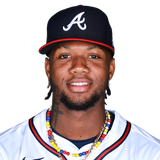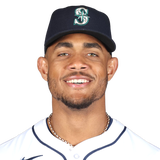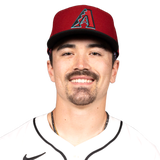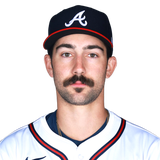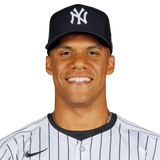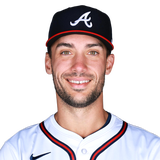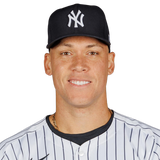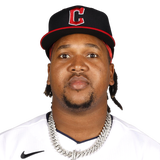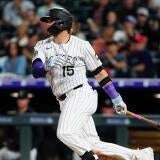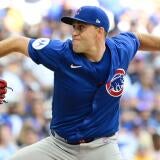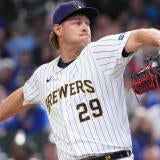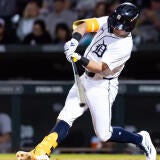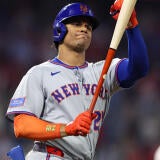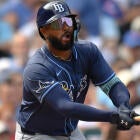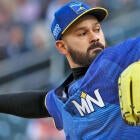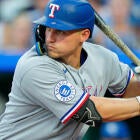| ||||||||||||
2024 Fantasy Baseball Draft Prep: Pros and cons for drafting every first-rounder
A winning team begins in Round 1

Like it or not, your first-round pick sets your team on a particular path. That's especially true in Rotisserie leagues, where you're tasked with balancing the different categories. Whatever you sacrifice early you'll have to make up for later.
So who should you take with your first-round pick? To a large degree, that's determined by draft order, but for most spots, there's still a choice to be made, even if it's only between two or three players. I'd like to help with that choice by making the case for and against each of 15 possible first-rounders.
Why not just tell you which one I'd draft? I sort of do, listing them by the order I rank them for standard 5x5 (i.e., Rotisserie) scoring. But I think there's room for debate, particularly after the top three, so I'd like you to go into that decision clear-eyed. You might prefer to build your team differently than I do.
The Case For: Let's see ... he's only coming off the best season ever, and I wouldn't call that an exaggeration. We've seen 40/40 players. We've seen 30/50 players. We've never seen anything close to a 40/70 player. Meanwhile, Ronald Acuna's 149 runs scored were the second-most for any player since 1949, and his .337 batting average would have led the majors three of the past five years. You're getting as big of an advantage as you can get across four different categories (and he's no slouch in RBI either), all from the same player.
The Case Against: It would have been near impossible to make a case against Acuña just three weeks ago, but then came the saga over the meniscus in his right knee, which sent him to Dr. Neal ElAttrache and had us waiting on pins and needles for an entire weekend. It turned out to be just inflammation. He's back playing and is expected to suffer no ill effects from the now-healed injury. But is it really healed? The most paranoid among us might back off if the bidding gets too high in a salary cap draft.
| ||||||||||||
The Case For: Acuña's 40-homer, 70-steal season took up all the oxygen, but Bobby Witt came within a stolen base of the fourth ever 30-homer, 50-steal season, making him nearly as much of an anomaly for power and speed. After a slow start, he hit .301 in the second half, which was more in line with his Statcast numbers and makes for a reasonable expectation going forward. He also plays shortstop, which is a position that can thin out surprisingly fast in leagues with 12 teams or more.
The Case Against: Witt may be a shortstop, but he's not an outfielder. No position comes close to being as shallow this year, particularly in five-outfielder leagues, and a big percentage of what quality options exist there are gone after Round 1. Suffice it to say you're in for an uphill battle if you take any other position with your first pick. By taking Witt, you're also precluding yourself from drafting Francisco Lindor, who's often the best player available near the end of Round 2. Witt may not meet your expectation for runs and RBI, too, seeing as he's in the Royals lineup.
| ||||||||||||
The Case For: Here we have yet another player whose power and speed contributions are like something from another era (which probably suggests we're in a brand new era), and taking him frees you up to go so many different directions with the rest of your draft that it's basically a layup. Plus, unlike Witt, Julio Rodriguez actually does meet the early outfield need, which is why consensus ADP has him a spot ahead.
The Case Against: Rodriguez's power and speed contributions may be next-level, but they're not quite on Witt's level. The former had 69 combined home runs and stolen bases last year. The latter had 79. Maybe the gap closes this year, but maybe not. Meanwhile, Witt would seem to be the better source of batting average seeing as he strikes out less. Rodriguez's streakiness also needs to be mentioned here. If not for him batting .429 last August, he would have hit .246 in 2023.
| ||||||||||||
The Case For: Stop me if you've heard this before: Corbin Carroll's power and speed contributions last year were something for the history books. He and Acuña became only the second and third players since 1990 to have at least 25 homers and 50 steals in a season (Hanley Ramirez in 2007 being the first), and what's doubly impressive in Carroll's case is that he did it as a rookie. Getting so many stolen bases so early -- and without sacrificing much in the other categories -- is something most Rotisserie players throughout history could only dream of, and to get it with the fourth pick is an absolute coup.
The Case Against: What's the deal with his right shoulder exactly? He had surgery on it in 2021, which cost him most of a minor-league season but seemed like water under the bridge until just before the All-Star break last year, when, on two separate occasions, a swing left him clutching the shoulder in what looked to be sheer agony. Both instances turned out to be false alarms, and there wasn't a third one for the entire second half. Still, it doesn't feel like we have closure there.
| ||||||||||||
The Case For: You know, sometimes it's as easy as pointing to the stat line. Who wouldn't want Mookie Betts' numbers, right? In particular, the runs aren't something you can expect to find at most points in the draft, and with Shohei Ohtani and Freddie Freeman now hitting behind him, that number could potentially go up. Betts is also the only first-round player who's multi-eligible, qualifying at outfield and second base with shortstop still to come.
The Case Against: Betts' multi-eligibility could come in handy depending how things shake out during the year, but with outfield being the scarcest position in Fantasy Baseball right now, that feature will be wasted on many. Meanwhile, Betts' stat line may not be as repeatable as it seems given that the 39 homers were a career high and the .307 batting average was his highest since 2018. If he regresses to closer to 30 homers and a .265 batting average (which is about what he hit in both 2021 and 2022), then he starts to look more like a top-15 pick than a top-five pick, especially given that he's no longer much help in stolen bases.
| ||||||||||||
The Case For: There's no better bet for batting average than Freddie Freeman, and that's arguably the most critical category to fill early in drafts. He's also a counting stats monster, his combined 233 runs and RBI last year equaling Betts for the third-most in baseball. And he's even added stolen bases to his game the past two years, eliminating the one reason you might have shied away from him with your first-round pick in the past.
The Case Against: Yeah, but is he going to keep running? His 23 stolen bases last year bested his previous high by 10, a mark he set just the year before. His home run output has also dipped in recent years, giving him a lower projection there than most other first-rounders. He's 34 years old now, and you never know when his age might begin to show. He's also not an outfielder, which, as I've already covered, can make for a difficult build this year.
| ||||||||||||
The Case For: After a 30-homer, 25-steal season in 2022, Tucker came within a home run of a 30/30 season in 2023, establishing a track record of power/speed supremacy. He also got his batting average back on track, as his low strikeout rate suggested he would, and moved up in the lineup such that he could actually score some runs as well as driving them in. He's poised to bat cleanup this year under a new manager, which could improve those run and RBI numbers further, and huzzah, he's an outfielder.
The Case Against: Tucker is indeed capable of filling out a stat line, but it does seem like his contributions are slightly less across the board, like we've just entered a lower tier as far as first-rounders go. Then again, you pick where you pick, so it does no good to harp on that. Even though he's proven his stolen base prowess twice over now, I still worry Tucker could stop running suddenly, particularly given his 33rd percentile sprint speed.
| ||||||||||||
The Case For: It was only a couple years ago that Ronald Acuña and Fernando Tatis were considered 1 and 1A at the top of Rotisserie drafts, and I'd still argue that Tatis is the closest thing to Acuña's peer in the game today. For those who would call his 2023 a down season, note that he was one of just eight players to deliver 25-plus homers and 25-plus steals even though he was suspended for the first three weeks of the season. And while he hit just .257, Statcast put his xBA at .281, which would further suggest that better days are ahead. Also, he's an outfielder.
The Case Against: There's a fair amount of projection in Tatis' upside case, and it's possible he's exactly the player we saw last year, particularly when you consider that, since his monstrous 2021, he's had not just a PED suspension but also wrist and shoulder surgeries. Petco Park is a difficult place to hit, so maybe his batting average will continue to lag behind other first-rounders. Same goes for his run and RBI production, which was a problem up and down the Padres lineup last year despite Juan Soto being a part of it.
| ||||||||||||
The Case For: At a time when there seems to be less separation between starting pitchers (a phenomenon I've come to describe as The Glob), Spencer Strider is the truest of standouts. He had 44 more strikeouts and three more wins than any other pitcher last year, and early indications are that a new curveball could make him even more dominant this year. If nothing else, a third offering should help curtail the blowup innings that plagued him from time to time last year, leaving him with a 3.86 ERA that belies his 3.09 xERA and 2.85 FIP.
The Case Against: But he did have a 3.86 ERA, didn't he? If you're going to sink a first-round pick in a pitcher, don't you need to be sure he's going to help in that category as well? The phrasing of that question raises another one: Does any starting pitcher make for a good first-round investment? About a week ago, Gerrit Cole would have been among the names discussed in this article, so why isn't he now? Strider may be the truest of standouts at a notoriously volatile position, but he's still subject to that volatility, especially since last year was his first time taking on an ace workload. It may be that any hitter you draft in this range actually does more to set your team apart than Strider will.
| ||||||||||||
The Case For: Juan Soto has been a first-round fixture since he first set foot in the majors, delivering MVP-caliber numbers as a 19-year-old in 2018, and now that he's been traded to the Yankees, he'll be playing half his games at what's been a magical venue for left-handed batters. Better yet, he'll be leaving San Diego, where he hit .240 with an .827 OPS last year compared to .307 with an 1.026 OPS on the road. A return to his former .300-hitting ways seems likely. So does a career-high in runs given his on-base prowess batting ahead of Aaron Judge.
The Case Against: Soto's swing isn't so pull-oriented, which means he might not benefit from playing at Yankee Stadium as much as you think. And who knows? Maybe his struggles at home last year were just happenstance and he'll never get back to being a .300 hitter again. His floor may not be much more than a second-round pick (barring injury, of course), but he's hit that floor each of the past two years.
| ||||||||||||
The Case For: Trea Turner was in the discussion to go No. 1 overall each of the past two years, so what a blessing that he's now available at the end of Round 1. You might say that a higher caliber of Rotisserie player has since been introduced -- what with Acuña, Witt, Rodriguez and Carroll all delivering historic power/speed numbers last year -- but who's to say Turner won't also approach 50 steals when he's not slumping for the first two-thirds of the season? Most people recognize that you can't take his .266 batting average at face value given that he hit .317 over the final two months and is a career .296 hitter, but they fail to factor in what an improved batting average would mean for his other numbers
The Case Against: Then again, Turner actually ran less during the two months when he hit .317 than during the four months when he hit .242, so maybe he's just not going to take advantage of the new stolen base environment the way other speedsters have. There were also some underlying plate discipline issues that suggest he may not be out of the woods for batting average, and if so, he's probably not so different from Francisco Lindor, who tends to go late in Round 2.
| ||||||||||||
The Case For: When I mentioned that Betts and Freeman tied for the third-highest combined run and RBI total last year, you probably assumed Acuña was ahead of them -- and he was. But Acuña himself was only No. 2. No. 1 was Olson with a whopping 266, and given his power and on-base skills in the heart of an absolutely stacked lineup, he's not likely to see much slippage there. The head start he gives you in those two categories is probably even more valuable than the advantage he gives you in home runs -- and he had seven more of those than anyone else last year.
The Case Against: Another 50-homer season is certainly within Olson's skill set, but need I remind you he hit only 34 in his first season with Atlanta? His .283 batting average was also a career high, making something in the .260 range a more reasonable expectation. That's a low mark to accept from a first-rounder, particularly one who gives you precisely nothing in stolen bases. No matter how you slice it, you're committing to a particular kind of build with Olson, and since he doesn't even address a positional scarcity, that may be a difficult pill to swallow for some.
| ||||||||||||
The Case For: With a career-best strikeout rate each of the past two years, Shohei Ohtani now has a chance to be a batting average standout in addition to his power and speed, but that's not even the most promising development for him. For as good as he was with the Angels the past three years, he now gets to bat between Mookie Betts and Freddie Freeman, which in and of itself makes it not hard to imagine him delivering the best numbers of his career. Purely by the numbers, then, he'd be a top-five player, right? Maybe even No. 2 behind Acuña.
The Case Against: You can't evaluate Ohtani purely by the numbers because of his DH-only status, which presents a real complication early in drafts. Not only are you blocking yourself from taking any of the DH-only bargains that come later in the draft, not to mention that extra first baseman you love, but you're also passing up the chance to take one of the few difference-makers at a scarcer position. And then there's the not-so-small matter of Ohtani playing through a recently reconstructed elbow that's preventing him from pitching this year. Sure, he's looked great so far, but issues could still arise. Finally, there's the latest hubbub involving Ohtani's interpreter and sports gambling, in which Ohtani's attorneys have cast their client as a victim of "massive theft." You can't help but wonder if there's more still to be revealed there.
| ||||||||||||
The Case For: Two years ago, Aaron Judge was nearly as far ahead of the pack in Fantasy as Acuña was last year, having just set an AL record with 62 home runs while delivering a combined run and RBI total that was basically on par with Olson's last year. So you may be getting an absolute steal here -- and in the form of an outfielder, no less.
The Case Against: The case for Judge leans heavily on 2022 because things went wrong for him last year. I don't mean so much performance-wise -- his 162-game pace was still 56 homers -- but he played only about two-thirds of the season because of a toe injury. You might say it was a freak incident, but health has been a recurring issue for him over the years, and even now, he's dealing with abdominal injury that's made his short-term outlook a bit cloudy. You may be signing up for a headache here.
| ||||||||||||
The Case For: A year ago, I ranked Jose Ramirez second overall, and now he's coming off a season with a higher batting average (.282 vs. .280) and combined home run and stolen bases total (52 vs. 49) than he was then. He's been a fixture atop the third base rankings for as long as anyone cares to remember and a model of consistency from year to year.
The Case Against: Third base seemed like the most dire position at this time a year ago, and I may have overreacted by ranking Ramirez second overall. The script is completely flipped now, with third base being arguably the deepest position. Meanwhile, him holding steady in stolen bases is kind of a problem in a year when so many of his early-round cohorts saw significant gains there. He's been a better run and RBI source in the past and may have suffered from some bad luck there, but then again, the Guadians lineup is no great shakes.
What changes in Head-to-Head points leagues?
Because it's so different this year, I thought I should share my top 15 for that format as well. If you're wondering why it's so different, the simple explanation is that stolen bases are less valuable in points leagues and plate discipline is way, way more valuable. The latter pulls down Witt and Rodriguez while propping up most everyone else, Soto in particular.
1. Ronald Acuña, OF, ATL
2. Mookie Betts, 2B/OF, LAD
3. Freddie Freeman, 1B, LAD
4. Juan Soto, OF, NYY
5. Kyle Tucker, OF, HOU
6. Corbin Carroll, OF, ARI
7. Matt Olson, 1B, ATL
8. Aaron Judge, OF, NYY
9. Bobby Witt, SS, KC
10. Julio Rodriguez, OF, SEA
11. Jose Ramriez, 3B, CLE
12. Fernando Tatis, OF, SD
13. Shohei Ohtani, DH, LAD
14. Spencer Strider, SP, ATL
15. Bryce Harper, 1B, PHI


